七年级下册英语报纸第32期答案
学英语七年级山西同步辅导第32期
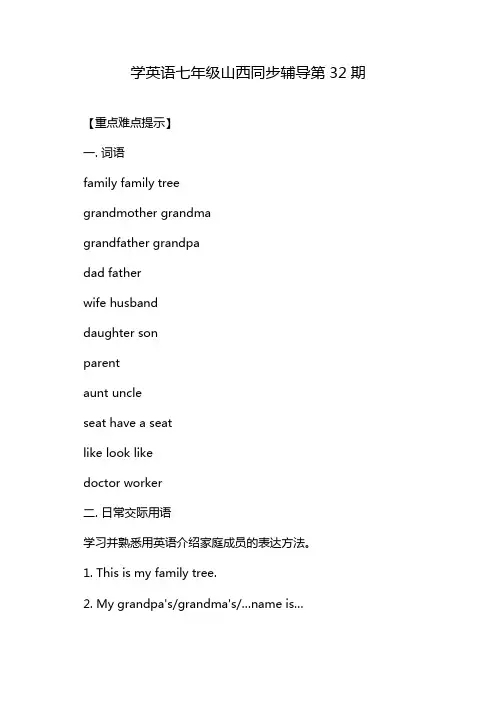
学英语七年级山西同步辅导第32期【重点难点提示】一. 词语family family treegrandmother grandmagrandfather grandpadad fatherwife husbanddaughter sonparentaunt uncleseat have a seatlike look likedoctor worker二. 日常交际用语学习并熟悉用英语介绍家庭成员的表达方法。
1. This is my family tree.2. My grandpa's/grandma's/…name is…3. Hi/Hello! This is…4. I' m fine, too. Thanks.5. Please come in. This way, please.6. Good afternoon/morning/evening.7. Please have a seat. Thank you.8. Glad to meet you.9. Is she like her dad or…?三. 语法学习名词所有格名词的所有格在英语中有些名词后可加's来表示所有关系,这种形式称为该名词的所有格。
如:Jim's father吉姆的父亲,the girl's name这个女孩的名字名词的所有格一般用于有生命的名词。
表示无生命的名词的所有关系,常用of构成的介词短语来表示。
如:a map of China一张中国地图,a picture of our school 一张我们学校的图片。
【例1】用英语完成句子,每空一词。
The football is under ① ② (她弟弟的)table.精析:该题要考查物主代词及名词的所有格形式。
①汉语“她弟弟的”真正含义为“她的弟弟的”故用形容词性物主代词her,而不能用人称代词she;②表示事物的所有关系,有生命的名词常用名词的所有格表示,即在该名词后+'s的形式,故此处“弟弟的”应用“brother's”来表示。
深圳牛津七年级报纸课件第32期参考答案

55. He seems to like the new place.
Ⅵ. (One possible version)
I have a small but tidy bedroom. On the right of the door, you’ll find a bed. Above the bed there are three beautiful pictures on the wall. Opposite the bed there is a wardrobe. Next to the wardrobe there is a sofa. On the left of the door, you’ll find a big bookshelf. Next to it there is a long desk. A computer is on it. Above the desk there is a window. In front of the desk is a chair. Do you like my bedroom?
W: A single room? That’s fine. In whose name shall I make the booking?
M: Jones. According to your ad, I should pay $50 for each day, including breakfast.
M: Thanks. Now, I have to find a job.
W: What kind of job would you like?
M: I’d like to be a fireman. I have a good sense of smell.
新版学生双语报英语答案32期
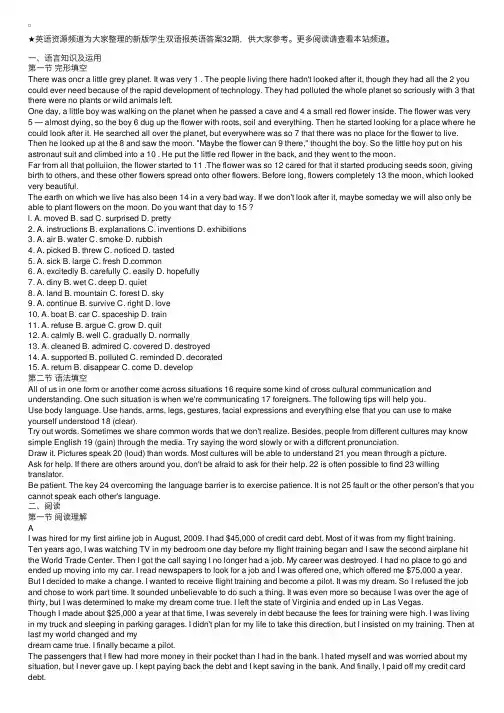
★英语资源频道为⼤家整理的新版学⽣双语报英语答案32期,供⼤家参考。
更多阅读请查看本站频道。
⼀、语⾔知识及运⽤第⼀节完形填空There was oncr a little grey planet. It was very 1 . The people living there hadn't looked after it, though they had all the 2 you could ever need because of the rapid development of technology. They had polluted the whole planet so scriously with 3 that there were no plants or wild animals left.One day, a little boy was walking on the planet when he passed a cave and 4 a small red flower inside. The flower was very 5 — almost dying, so the boy 6 dug up the flower with roots, soil and everything. Then he started looking for a place where he could look after it. He searched all over the planet, but everywhere was so 7 that there was no place for the flower to live. Then he looked up at the 8 and saw the moon. "Maybe the flower can 9 there," thought the boy. So the little hoy put on his astronaut suit and climbed into a 10 . He put the little red flower in the back, and they went to the moon.Far from all that polluiion, the flower started to 11 .The flower was so 12 cared for that it started producing seeds soon, giving birth to others, and these other flowers spread onto other flowers. Before long, flowers completely 13 the moon, which looked very beautiful.The earth on which we live has also been 14 in a very bad way. If we don't look after it, maybe someday we will also only be able to plant flowers on the moon. Do you want that day to 15 ?l. A. moved B. sad C. surprised D. pretty2. A. instructions B. explanations C. inventions D. exhibitions3. A. air B. water C. smoke D. rubbish4. A. picked B. threw C. noticed D. tasted5. A. sick B. large C. fresh mon6. A. excitedly B. carefully C. easily D. hopefully7. A. diny B. wet C. deep D. quiet8. A. land B. mountain C. forest D. sky9. A. continue B. survive C. right D. love10. A. boat B. car C. spaceship D. train11. A. refuse B. argue C. grow D. quit12. A. calmly B. well C. gradually D. normally13. A. cleaned B. admired C. covered D. destroyed14. A. supported B. polluted C. reminded D. decorated15. A. return B. disappear C. come D. develop第⼆节语法填空All of us in one form or another come across situations 16 require some kind of cross cultural communication and understanding. One such situation is when we're communicating 17 foreigners. The following tips will help you.Use body language. Use hands, arms, legs, gestures, facial expressions and everything else that you can use to make yourself understood 18 (clear).Try out words. Sometimes we share common words that we don't realize. Besides, people from different cultures may know simple English 19 (gain) through the media. Try saying the word slowly or with a diffcrent pronunciation.Draw it. Pictures speak 20 (loud) than words. Most cultures will be able to understand 21 you mean through a picture.Ask for help. If there are others around you, don't be afraid to ask for their help. 22 is often possible to find 23 willing translator.Be patient. The key 24 overcoming the language barrier is to exercise patience. It is not 25 fault or the other person's that you cannot speak each other's language.⼆、阅读第⼀节阅读理解AI was hired for my first airline job in August, 2009. I had $45,000 of credit card debt. Most of it was from my flight training. Ten years ago, I was watching TV in my bedroom one day before my flight training began and I saw the second airplane hit the World Trade Center. Then I got the call saying I no longer had a job. My career was destroyed. I had no place to go and ended up moving into my car. I read newspapers to look for a job and I was offered one, which offered me $75,000 a year. But I decided to make a change. I wanted to receive flight training and become a pilot. It was my dream. So I refused the job and chose to work part time. It sounded unbelievable to do such a thing. It was even more so because I was over the age of thirty, but I was determined to make my dream come true. I left the state of Virginia and ended up in Las Vegas.Though I made about $25,000 a year at that time, I was severely in debt because the fees for training were high. I was living in my truck and sleeping in parking garages. I didn't plan for my life to take this direction, but I insisted on my training. Then at last my world changed and mydream came true. I finally became a pilot.The passengers that I flew had more money in their pocket than I had in the bank. I hated myself and was worried about my situation, but I never gave up. I kept paying back the debt and I kept saving in the bank. And finally, I paid off my credit card debt.Today, I am a skilled airline pilot based in Milwaukee. I wrote in my spare time. My autobiography (⾃传) has been published, which sells well. That is my first book, but it won't be my last one.26. When the second airplane hit the World Trade Center, the writer was probably __________.A. working in his officeB. watching TV at homeC. answering a phone callD. searching for job information27. Why did the writer refuse the job?A. Because he didn't like it.B. Because the pay was low.C. Because he wanted to follow his dream.D. Because he was frightened to。
21世纪学生英语报初一32期答案
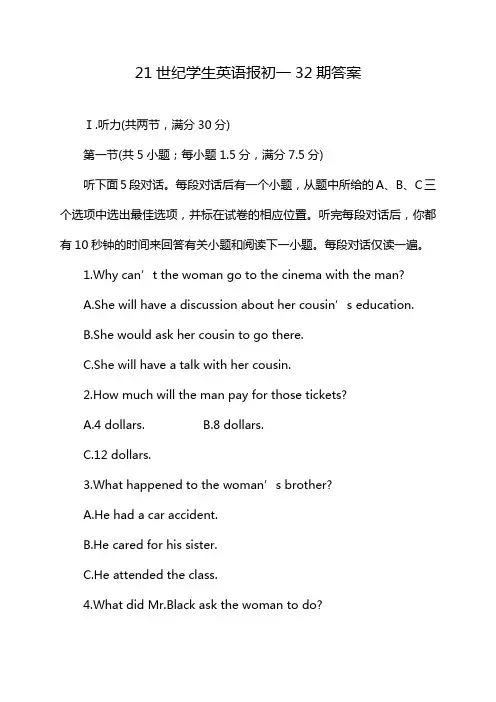
21世纪学生英语报初一32期答案Ⅰ.听力(共两节,满分30分)第一节(共5小题;每小题1.5分,满分7.5分)听下面5段对话。
每段对话后有一个小题,从题中所给的A、B、C三个选项中选出最佳选项,并标在试卷的相应位置。
听完每段对话后,你都有10秒钟的时间来回答有关小题和阅读下一小题。
每段对话仅读一遍。
1.Why can’t the woman go to the cinema with the man?A.She will have a discussion about her cousin’s education.B.She would ask her cousin to go there.C.She will have a talk with her cousin.2.How much will the man pay for those tickets?A.4 dollars.B.8 dollars.C.12 dollars.3.What happened to the woman’s brother?A.He had a car accident.B.He cared for his sister.C.He attended the class.4.What did Mr.Black ask the woman to do?A.To type something important.B.To see an interesting movie.C.To send a notice to him.5. What’s the possible relationship between the two speakers?A.Passenger and driver.B.Husband and wife.C.Guide and visitor.第二节(共15小题;每小题1.5分,满分22.5分)听下面5段对话或独白。
英语测试报32期答案
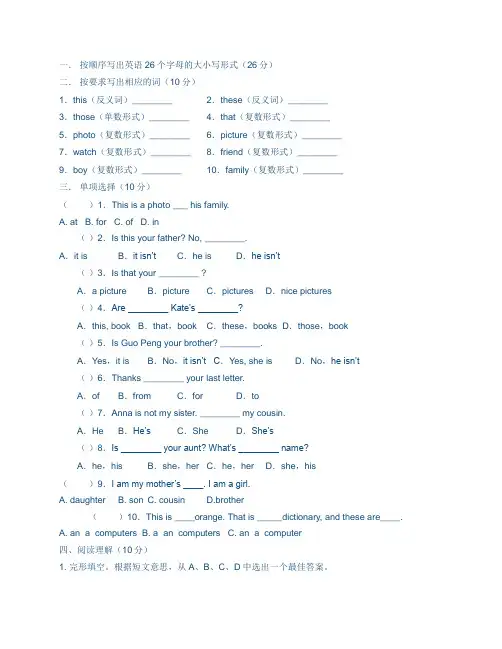
一.按顺序写出英语26个字母的大小写形式(26分)二.按要求写出相应的词(10分)1.this(反义词)________ 2.these(反义词)________3.those(单数形式)________ 4.that(复数形式)________5.photo(复数形式)________ 6.picture(复数形式)________7.watch(复数形式)________ 8.friend(复数形式)________9.boy(复数形式)________ 10.family(复数形式)________三.单项选择(10分)()1.This is a photo ___ his family.A. atB. forC. ofD. in()2.Is this your father? No, ________.A.it is B.it isn’t C.he is D.he isn’t()3.Is that your ________ ?A.a picture B.picture C.pictures D.nice pictures()4.Are ________ Kate’s ________?A.this, book B.that,book C.these,books D.those,book()5.Is Guo Peng your brother? ________.A.Y es,it is B.No,it isn’t C.Y es, she is D.No,he isn’t()6.Thanks ________ your last letter.A.of B.from C.for D.to()7.Anna is not my sister. ________ my cousin.A.He B.He’s C.She D.She’s()8.Is ________ your aunt? What’s ________ name?A.he,his B.she,her C.he,her D.she,his()9.I am my mother’s ____. I am a girl.A. daughterB. sonC. cousinD.brother()10.This is ____orange. That is _____dictionary, and these are____.A. an a computersB. a an computersC. an a computer四、阅读理解(10分)1. 完形填空。
英语七年级济宁专版第32期答案小张报纸
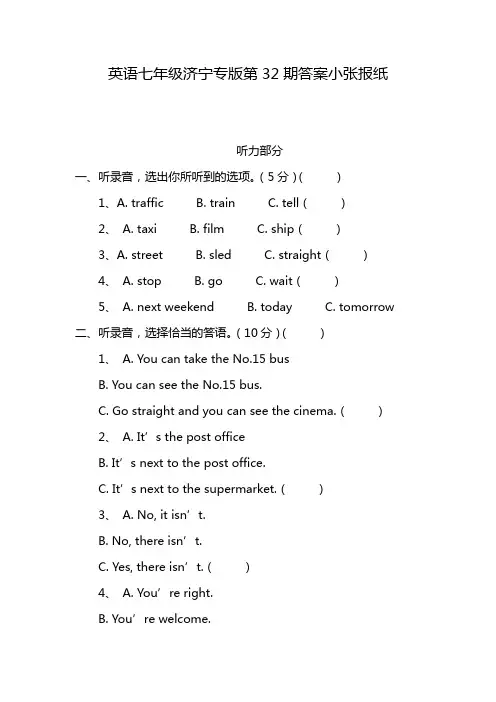
英语七年级济宁专版第32期答案小张报纸听力部分一、听录音,选出你所听到的选项。
(5分)()1、A. traffic B. train C. tell()2、A. taxi B. film C. ship()3、A. street B. sled C. straight()4、A. stop B. go C. wait()5、A. next weekend B. today C. tomorrow二、听录音,选择恰当的答语。
(10分)()1、A. You can take the No.15 busB. You can see the No.15 bus.C. Go straight and you can see the cinema.()2、A. It’s the post officeB. It’s next to the post office.C. It’s next to the supermarket.()3、A. No, it isn’t.B. No, there isn’t.C. Yes, there isn’t.()4、A. You’re right.B. You’re welcome.C. see you.三、听录音,判断下列句子与你所听内容是(T)否(F)一致。
(10分)()1、There is a new bookstore in my city.()2、I’m going to the library on fo ot tomorrow.()3、Turn right at the zoo.()4、Mike is going to play basketball after school.()5、Tina is going to Beijing with her mother.四、听对话并填空。
(10分)1、The __________ __________ is on your right.2、__________ do you get there? __________ __________.3、Turn right at the __________. Then you can see the __________.4、The nature park is __________ __________ my school.5、Jack is going to Hainan by __________.笔试部分一、语法选择(共15小题;每小题1分,满分15分)阅读下面短文,按照句子结构的语法性和上下文连贯的要求,从1~15各题所给的A、B、C和D项中选出最佳选项,并在答题卡上将该项涂黑。
七年级下册英语报纸学英语报纸答案七年级
七年级下册英语报纸-学英语报纸答案七年级七年级语文报纸答案七年级语文报纸答案一、语文知识积累与运用1、根据语境及拼音在横线上填入恰当的字。
(4分)打开心灵的窗口,睁开敏ruì()的眼睛,莫让一切都随风。
一时一事的得失,似乎永远困rǎo()着我们,永远是生命的fán()恼之泉。
一个人最难认识的是自己,悲惨的结局在于自以为找到了答案而其实完全南辕北zhé( ) 。
2.修改下面病句。
(1)我们一定要发扬和继承神农炎帝坚韧不拔、开拓创新的精神。
修改意见:(2)是否重视课内外阅读,是学好语文的关键。
修改意见:3、填写古诗句。
①马上相逢无纸笔,。
②,思君不见下渝州。
③独坐幽篁里,。
④云南地震牵动着全球民众的心!灾害发生后,全国各地派遣的救援人员十万火急地奔赴灾区。
用《木兰诗》中“,。
”一句来形容最为恰当。
⑤《木兰诗》中通过环境描写,渲染军旅生活悲壮严酷气氛,烘托木兰勇敢、坚强性格的名句是:,。
⑥一切都是瞬息,一切都将会过去;而那过去了的,。
4、综合性学习:在我们常用的俗语中,有许多和黄河有关,请任意写出一条并说说它的意义。
(4分)俗语:含义:5、下面衣一份是对200名初中生课外阅读调查情况表,请根据这个表回答下面的问题。
阅读内容人数百分比卡通书11256%时文杂志3216%武侠小说3015%文学名著2613%⑴从表中可以得出一个结论,即。
⑵看了这一结果,你对同学的建议是。
6、名著填空:(4分)(1) 蜜蜂的幼虫们都被母亲安置在四周紧闭的小屋里,或呆在丝织的茧子里,为的是可以静静地睡一个长觉,直到它们变为成虫。
可是这些宏伟的蓝图往往不能实现,敌人自有办法攻进这四面不通的堡垒。
每个敌人都有它特殊的战略——那些绝妙又狠毒的技巧,你根本连想都想不到。
你看,一只奇异的虫,靠着一根针,把它自己的卵放到一条蛰伏着的幼虫旁边——这幼虫本是这里真正的主人;或是一条极小的虫,边爬边滑地溜进了人家的巢,于是,蛰伏着的主人永远长睡不醒了,因为这条小虫立刻要把它吃掉了。
笔刷题英语第32面答案七下
笔刷题英语第32面答案七下As Ginni Bazlinton reached Antarctica, she found herself greeted by a group of little Gentoo penguins(企鹅) longing to say hello. These gentle, lovely gatekeepers welcomed her and kick-started what was to be a trip Ginni would never forget.Ever since her childhood, Ginni, now 71, has had a deep love for travel. Throughout her career(职业) as a professional dancer, she toured in the UK, but always longed to explore further When she retired from dancing and her sons eventually flew the nest, she decided it was time totake the plunge.After taking a degree at Chichester University in Related Arts, Ginni began to travel the world, eventually getting work teaching English in Japan and Chile. And it was in Chile she discovered she could get last-minute cheap deals on ships going to Antarctica from the islands off Tierra del Fuego, the southernmost tip of the South American mainland. “I just decided wanted to go,” she says. “I had no idea about what I’d find there and I wasn’t nervous, I just wanted to do it. And I wanted to do it alone as I always prefer it that way.”In March 2008, Ginni boarded a ship with 48 passengers she’d never met before, to begin the journey towards Antarctica. “From seeing the wildlife to witnessing sunrises, the wholeexperience was amazing. Antarctica left an impression on me that no other place has,” Ginni says. “I remember the first time I saw a humpback whale; it just rose out of the water like some prehistoric creature and I thought it was smiling at us. You could still hear the operatic sounds it was making underwater.”The realization that this is a precious land, to be respected by humans, was one of the biggest things that hit home to Ginni.1.Which of the following best explains “take the plunge”underlined in paragraph 2?A.Try challenging things.B.Take a degree.C.Bring back lost memories.D.Stick to a promise.2.What made Ginni decide on the trip to Antarctica?A.Lovely penguins.B.Beautiful scenery.C.A discount fare.D.A friend’s invitation.3.What does Ginni think about Antarctica after the journey?A.It could be a home for her.B.It should be easily accessible.C.It should be well preserved.D.It needs to be fully introduced.4.What is the text mainly about?A.A childhood dream.B.An unforgettable experience.C.Sailing around the world.D.Meeting animals in Antarctica.【答案】1. A 2. C 3. C 4. A【解析】【导语】本文是一篇说明文。
七年级英语下册Lesson32教材内容详解冀教版
Lesson 32 Unit Review复习课Ι。
Building Your Vocabulary建立你的单词库.A:Fill in the blank with the proper word.The first letter is given.用合适的词填空。
首字母已经给出。
1.Don’t watch Tv until you finish your h____. 直到你完成你的_____,你才能看电视。
2.My friend i____me to go on a trip to Beijing . 我的朋友_____我去北京旅行。
3.Look!There is a book s_____.Let’s buy some books there .看!那儿有个书____。
让我们去那儿买些书吧。
4.There are twelve m____in a year.一年有十二个____.B.Fill in each blank with a proper word or phrase from the e the correct form. 用下列所给的单词或词组的正确形式填空。
晚上在聚会上。
2.I _____a gift ____my Dad yesterday.我____一个___ 我的父亲。
3.What ____ to the little girl ? She’ crying .什么____这个小女孩?她正在哭。
4.Could you please _____of me with my camera?你能____我用我的照相机。
st summer ,I ____to Hzinan 去年暑假,我____去海南。
6A .Rewrite the sentences following the example. 根据下列例子重写句子。
Example:例子:I have breakfast at 7:00 every day .我每天7:00吃早饭。
英语辅导报七年级下册答案32期Module6水平测试
英语辅导报七年级下册答案32期Module6水平测试1. 单项选择1. There is ______ eraser on the desk. It’s Mary’s. [单选题] *A. aB. an(正确答案)C. theD. /2. —Hi, Jim. Is this your bike or Mary’s?—It’s mine, not ______. [单选题] *A. herB. himC. hisD. hers(正确答案)3. I like basketball, but now I'd like tennis.[单选题] *A. to play; playingB. playing; playingC. playing; to play(正确答案)D. to playing; to playing4. —How many people come to your town every week?—It’s hard to say. _______ people, I think.[单选题] *A. Five thousand ofB. Hundred ofC. Five hundredsD. Thousands of(正确答案)5. He can ______ you ______ your lost things.[单选题] *A. help; find(正确答案)B. helps; to findC. help; findingD. helps; look for6. Please _____that knife, or you’ll cut yourself.[单选题] *A.be careful with(正确答案)B. be carefulC. be careless ofD. be careless7. Are you plant(种植) trees on March 12th?[单选题] *A. readyB. ready withC. ready inD. ready to(正确答案)8. ___ Saturday morning I usually do my homework and ____ the afternoon I usually play tennis. [单选题] *A. On; in(正确答案)B. In; onC. On; byD. In; at9. --- Can you play the piano?--- Yes , I , and I'm good at it.[单选题] *A. mayB. can(正确答案)C.doD. must10. Mary doesn’t like apples. Tom doesn’t like them ______. [单选题] *A. tooB. alsoC. either(正确答案)D. as well as11. 完形填空I want to do many things this weekend. On Saturday morning, I’m going to 11 a music magazine. I love music and I 12 read music magazines. I often buy 13 in the small bookshop near my home. In the afternoon, I’m going to 14 to swim. My best friend, Nick, will teach me. He is 15 swimming. We plan to swim for two 16 and then go to the KFC to eat something.On Sunday 17, I’m going to practice (练习) playing the piano. That’s 18 I do every Sunday morning. Playing the piano is my favourite. I t’s very 19 and it makes me relaxed (放松的). In the afternoon, I’m going to do my homework and then go for a walk with my parents in the park.These are my plans 20 the weekend.( )11. A. like B. make C. read D. start( )12. A. never B. often C. only D. still( )13. A. them B. it C. her D. other( )14. A. wait B. drive C. leave D. learn( )15. A. good for B. bad at C. good at D. bad for( )16. A. minutes B. hours C. years D. days( )17. A. afternoon B. evening C. night D. morning( )18. A. what B. which C. how D. when( )19. A. tidy B. interesting C. clean D. silly( )20. A. to B. from C. for D. with( )11. A. like B. make C. read D. start[单选题] *A. likeB. makeC. read(正确答案)D. start12. A. never B. often C. only D. still [单选题] *A. neverB. often(正确答案)C. onlyD. still13. A. them B. it C. her D. other [单选题] *A. them(正确答案)B. itC. herD. other14. A. wait B. drive C. leave D. learn [单选题] *A. waitB. driveC. leaveD. learn(正确答案)15. A. good for B. bad at C. good at D. bad for [单选题] *A. good forB. bad atC. good at(正确答案)D. bad for16. A. minutes B. hours C. years D. days [单选题] *B. hours(正确答案)C. yearsD. days17. A. afternoon B. evening C. night D. morning [单选题] *A. afternoonB. eveningC. nightD. morning(正确答案)18. A. what B. which C. how D. when [单选题] *A. what(正确答案)B. whichC. howD. when19. A. tidy B. interesting C. clean D. silly [单选题] *A. tidyB. interesting(正确答案)C. cleanD. silly20. A. to B. from C. for D. with [单选题] *A. toC. for(正确答案)D. with21. 阅读理解 APeter goes to see his friend in New York. His friend is in an art club there. Peter goes there for the first time, so he doesn't know New York very well. And he can't find his way to the art club. A girl is at a bus stop. He walks to her and says, "Excuse me, can you tell me the way to Center Street?"The girl is friendly. She smiles, but she can't speak English. She can speak French. She is also new there. She takes out a small notebook from her bag and writes something on it. "I'm sorry. I can't speak English."()21. Peter goes to New York toA. find a jobB. see the girlC. work in the art clubD. see his friend()22. Peter's friend works in .A. an art clubB. a schoolC. a chess clubD. a bus stop()23. Peter can't find his way because(因为) .A. he is new in New YorkB. he can't see thingsC. he is oldD. he is tired()24. What's the meaning of "friendly" in Chinese?A. 生气的B. 热情的C. 冷淡的D. 友好的()25. Which of the following is RIGHT?A. The girl at the bus stop is an American.B. The girl can help Peter.C. The girl can't help Peter.D. The girl gives the notebook to Peter.()21. Peter goes to New York to [单选题] *A. find a jobB. see the girlC. work in the art clubD. see his friend(正确答案)22. Peter's friend works in .A. an art clubB. a schoolC. a chess clubD. a bus stop [单选题] *A. an art club(正确答案)B. a schoolC. a chess clubD. a bus stop23. Peter can't find his way because(因为) .A. he is new in New YorkB. he can't see thingsC. he is oldD. he is tired [单选题] *A. he is new in New York(正确答案)B. he can't see thingsC. he is oldD. he is tired24. What's the meaning of "friendly" in Chinese?A. 生气的B. 热情的C. 冷淡的D. 友好的 [单选题] *A. 生气的B. 热情的C. 冷淡的D. 友好的(正确答案)25. Which of the following is RIGHT?A. The girl at the bus stop is an American.B. The girl can help Peter.C. The girl can't help Peter.D. The girl gives the notebook to Peter. [单选题] *A. The girl at the bus stop is an American.B. The girl can help Peter.C. The girl can't help Peter.(正确答案)D. The girl gives the notebook to Peter26. 阅读理解 B篇Today is the first day of the summer holiday. Jane’s mum plans to take her to the beach.Jane is so happy. She gets up at six o’clock in the morning. Her mum gets up, too. She gives Jane a bag. “Put the things you need on the beach into the bag,” she says. Then she goes to make breakfast. Jane puts so many things into the bag. She puts her favourite book, her teddy bear, her candy box and even her painting tools (绘画工具) into the bag.The weather looks good when they have breakfast. “We will have a nice day onthe beach,” Jane thinks. They get in the car at half past seven. It will take them two hours to get to the beach. But on their way, it starts raining. “What bad luck!”Jane says. “We must remember to listen to the weather report (预报) next time!” says Mum, “Let’s see a movie instead (代替).”( )26. Jane feels _____ when she gets up in the morning.A. tiredB. happyC. luckyD. bad( )27. Jane uses a bag to take things she needs _____.A. for schoolB. for breakfastC. on the beachD. at the theater( )28. What doesn’t Jane plan to do during her holiday?A. Watch a movie.B. Read a book.C. Have some candies.D. Draw a picture.( )29. The right time order (顺序) is _____.① It starts raining.②Jane’s mum gives Jane a bag.③ They will see a movie.④Jane’s mum goes to make breakfast.A. ①②③④B. ②④①③C. ②④③①D. ①④②③( )30. What’s the best title (标题) for the passage?A. A great trip to the beachB. A boring day in summerC. Jane’s plan for her school dayD. The first day of the summer holiday( )26. Jane feels _____ when she gets up in the morning. [单选题] *A. tiredB. happy(正确答案)C. luckyD. bad27. ( ) Jane uses a bag to take things she needs _____.A. for schoolB. for breakfastC. on the beachD. at the theater [单选题] *A. for schoolB. for breakfastC. on the beach(正确答案)D. at the theater28. ()What doesn’t Jane plan to do during her holiday?A. Watch a movie.B. Read a book.C. Have some candies.D. Draw a picture. [单选题] *A. Watch a movie.(正确答案)B. Read a book.C. Have some candies.D. Draw a picture.29. ()The right time order (顺序) is _____.① It starts raining.②Jane’s mum gives Jane a bag.③ They will see a movie.④Jane’s mum goes to make breakfast.A. ①②③④B. ②④①③C. ②④③①D. ①④②③ [单选题] *A. ①②③④B. ②④①③(正确答案)C. ②④③①D. ①④②③30. ()What’s the best title (标题) for the passage?A. A great trip to the beachB. A boring day in summerC. Jane’s plan for her school dayD. The first day of the summer holiday [单选题] *A. A great trip to the beachB. A boring day in summerC. Jane’s plan for her school dayD. The first day of the summer holiday(正确答案)31. 词汇运用(直接在方框内填入完整的单词)"Don't (担忧) about me. I can make it!" Sally said to her parents. [填空题] * _________________________________(答案:worry)32. We always keep our classroom clean and (整洁) [填空题] *_________________________________(答案:tidy)33. How many _____ (运动员) are there in the team? [填空题] *_________________________________(答案:players)34. Lingling plans to read lots of books _____ (在……期间) the holiday. [填空题] * _________________________________(答案:during)35. Can you guess which team can ________ (获胜) the football match? [填空题] * _________________________________(答案:win)36. 根据首字母,直接在放方框内填入完整的单词。
